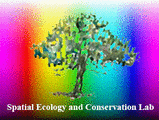General overview of schedule for graduate students
Detailed descriptions are provided by, and vary, with each program.
Default timeline for a SFRC PhD student
First semester
- Idea development
- Discuss potential committee members. See committee page for specific requirements.
- Begin adding committee members
Second semester
- Develop study plan. See study plan page and template for specific requirements.
- Complete core committee members
- First committee meeting - mid to end of semester
- discuss overall interests
- discuss summer research plans and objectives
- discuss and sign off on study plan
Summer 1 - ranges from exploratory research to publishable research depending on student
Third semester
- Second committee meeting - start of Fall semester
- Discus summer advances
- Discuss in more detail PhD research interests
- Over semester write up a PhD research proposal per guidelines on 'students' page
- Share research proposal with committee and have 1-2 rounds of revisions (by late mid semester)
- Third committee meeting - late-mid Fall semester
- Proposal defense - See 'students' page for detailed information.
- 20 minute presentation of proposed research
- Discussion of research proposal
- Proposal defense - See 'students' page for detailed information.
- Share revised final proposal with committee - Late-end of Fall semester
Fourth semester
- Assign themes and format for each committee member
- Written qualifying exams - mid Spring semester
- Oral qualifying exam - Late Spring semester
Summer 2 - PhD research suitable for inclusion as a chapter
Fifth to sixth semester (if on a 4 year plan)
- Field data collection, analysis and writing
- Often conducting extensive field work or based entirely at field sites depending
Seventh semester (if on a 4 year plan)
- Final exam / Thesis defense - late-mid Fall semester. See 'students' page for detailed information.
Eighth semester (if on a 4 year plan)
- Complete revised version of PhD
- Submit to UF graduate school
- Graduation (typically May)
Default timeline for a SFRC MS student
First semester
- Idea development
- Discuss potential committee members. See committee page for specific requirements.
- Begin adding committee members
Second semester
- Develop study plan. See study plan page and template for specific requirements.
- Complete core committee members
- First committee meeting - start of semester
- discuss overall interests
- discuss and sign off on study plan
- Second committee meeting - mid to end of semester
- discuss summer research plans and objectives
- Over semester write up a MS research proposal per guidelines on 'students' pagE
- Share research proposal with committee and have 1 round of revisions (by late mid semester)
Summer - MS research suitable for inclusion as a chapter (s). Manuscript format.
Third semester
- Data analysis and write up
- Thesis defense - late semester
Fourth semester
- Complete revised version of MS
- Submit to UF graduate school
- Graduation (typically May)
